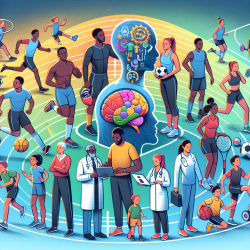Introduction
In recent years, the mental health of athletes has garnered significant attention, particularly as it parallels the prevalence of mental health issues in the general population. The International Olympic Committee (IOC) has responded by developing the Sport Mental Health Assessment Tool 1 (SMHAT-1) and the Sport Mental Health Recognition Tool 1 (SMHRT-1). These tools aim to provide a structured approach for identifying and managing mental health symptoms and disorders in elite athletes.
Understanding SMHAT-1 and SMHRT-1
The SMHAT-1 is designed for sports medicine physicians and licensed mental health professionals to assess athletes at risk for mental health issues. It consists of a triage process, disorder-specific screening tools, and a clinical assessment. The SMHRT-1, on the other hand, is intended for use by athletes' entourage, such as coaches and family members, to recognize early signs of mental health concerns.
Key Findings from the Research
- The prevalence of mental health symptoms among elite athletes is substantial, with anxiety and depression being the most common.
- SMHAT-1 facilitates early identification and timely referral of athletes in need of mental health support.
- SMHRT-1 empowers non-clinical personnel to recognize mental health issues and encourage help-seeking behavior.
Implications for Practitioners
For practitioners in the field of sports medicine and mental health, the implementation of SMHAT-1 and SMHRT-1 offers a data-driven approach to improving athlete well-being. By incorporating these tools into regular health screenings, practitioners can ensure that mental health is given the same priority as physical health.
Encouraging Further Research
While the initial validation of these tools is promising, further research is needed to assess their effectiveness across different sports and cultural contexts. Practitioners are encouraged to contribute to this body of research by sharing their experiences and outcomes using SMHAT-1 and SMHRT-1.
Conclusion
The development of SMHAT-1 and SMHRT-1 marks a significant step forward in supporting the mental health of elite athletes. By integrating these tools into practice, practitioners can play a crucial role in enhancing the overall well-being of athletes. For those interested in the detailed research behind these tools, the original research paper can be accessed here.










